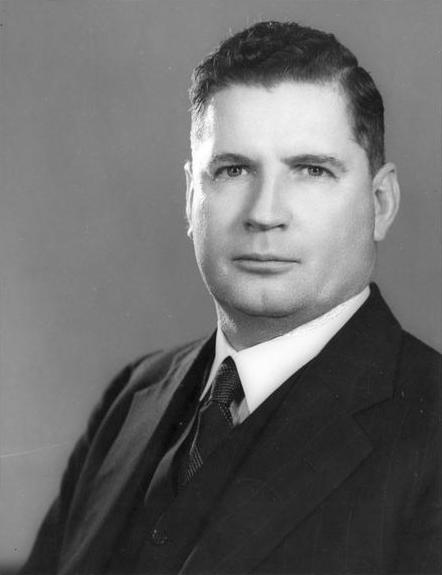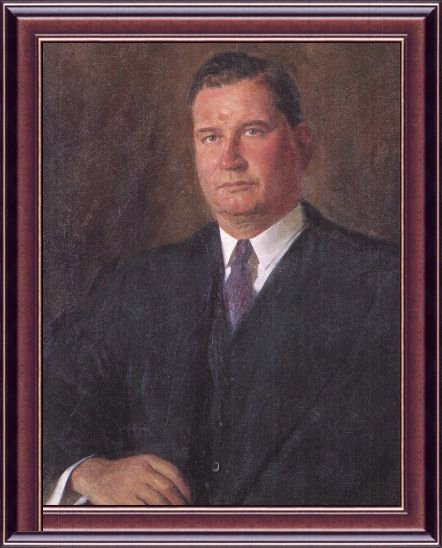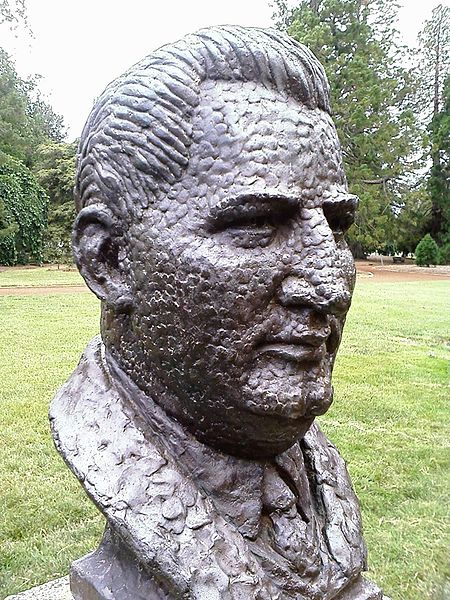<Back to Index>
- Psychoanalyst Jacques Marie Émile Lacan, 1901
- Sculptor Louis Ernest Barrias, 1841
- 13th Prime Minister of Australia Arthur William Fadden, 1894
PAGE SPONSOR



Sir Arthur William Fadden, GCMG (13 April 1894 – 21 April 1973) was an Australian politician and, briefly, the 13th Prime Minister of Australia.
Fadden was born in Ingham, Queensland, on 13 April 1894 the son of a Presbyterian police officer. He was educated at state schools, and later studied accountancy while working as a clerk. Once he had qualified he became assistant Town Clerk of Mackay, then Town Clerk. In 1919 Fadden helped form the North Queensland Rugby League, and served as its founding secretary. In the 1920s he established a successful accountancy firm with offices in Brisbane and Townsville. He was active in the Country Party from its foundation.
In 1932 Fadden was elected for one term to the Queensland Legislative Assembly. He was defeated in 1935. The following year, though, he won a by-election in the federal seat of Darling Downs. He was a blunt, effective debater and soon made an impression. When Archie Cameron resigned suddenly as Country Party leader in 1940, there was a deadlock between Sir Earle Page and Sir John McEwen in the ballot to select a new leader, and Fadden was chosen as a compromise candidate. He was appointed Minister for Supply and Development, then Minister for Air, then Treasurer (finance minister).
In August 1941 Robert Menzies resigned as Prime Minister. So bereft of leadership had the United Australia Party (UAP) become by this time that Fadden was invited to become Prime Minister, although the Country Party was the smaller of the two anti - Labor parties.
He did not last long in the top office. On 3 October, the two independent parliamentarians who were keeping the government in office, Arthur Coles and Alex Wilson, voted against Fadden's budget. Coles and Wilson had been so disgusted with how Menzies had been treated that they refused to support the Coalition any longer. As a consequence of that, Fadden submitted his government's resignation to the Governor - General Lord Gowrie later the same day. This was the last occasion to date on which defeat on the floor of the House of Representatives obliged a government to resign. Fadden joked that he was like the Flood: he had "reigned for 40 days and 40 nights".
Gowrie then commissioned Labor leader John Curtin to form a government, but only after sending for Coles and Wilson and demanding a guarantee from them that, if he commissioned Curtin, they would support him and end the instability in government. Coles and Wilson agreed to this, so Curtin's Labor ministry was sworn in on 7 October.
There was some dispute over whether Menzies or Fadden should become Leader of the Opposition, but most of the UAP supported Fadden even though the UAP was nominally senior coalition partner. Menzies resigned as UAP leader, and was replaced by former Prime Minister Billy Hughes. The Coalition sank into near paralysis in opposition, and Fadden was unable to get the better of Curtin. The Coalition suffered a crushing defeat in the 1943 election. He then handed the Opposition leadership back to Menzies, who had resumed the UAP leadership.
After the 1946 election, Fadden resumed his political partnership with Robert Menzies. Two years earlier, Menzies had folded the UAP into the new Liberal Party of Australia. There was some speculation that the Country Party would be included in the merger (as had already happened in several states), but Fadden was keen to assert the independence of his party.
Always an outspoken conservative, in the late 1940s he became a strong anti - communist, urging Menzies to ban the Communist Party if he ever came to power. Indeed, in the lead up to the 1949 federal election, Fadden often made inflammatory claims about the "socialist" nature of the Labor Party which Menzies could then "clarify" or repudiate as he saw fit, thus appearing more "moderate". His often extreme views were concealed behind a jolly public manner and he enjoyed his nickname "Artie."
The Coalition won a massive victory in that election, and Fadden became Treasurer in the second Menzies government. Although inflation was
very high in the early 1950s, forcing him to impose several "horror
budgets," he generally presided over a booming economy, with times
especially good for farmers. He retired before the 1958 election and lived quietly until his death in Brisbane in 1973. Fadden was made a Knight Commander of the Order of St Michael and St George (KCMG) in 1951, and
in 1958 was raised to Knight Grand Cross (GCMG) of the order. The
honour was conferred upon Fadden by King George VI in London on 31
January 1952, only a week before the King's death. The Canberra suburb of Fadden and the Division of Fadden are named after him. In 1975 he was honoured on a postage stamp bearing his portrait issued by Australia Post.